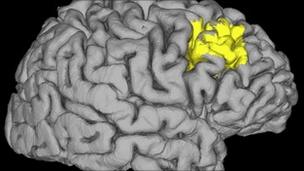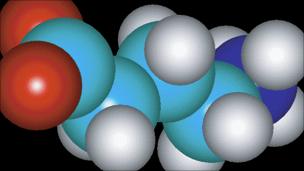Cardiff University on brain chemistry and aggression
- Published

Image showing the dorsolateral prefrontal cortex in the brain
Aggressive and impulsive behaviour in men could be linked to a deficiency of a particular type of neurotransmitter in the brain, a new study by Cardiff University scientists claims.
Neurological scientists have long suspected that impulsive and irrational behaviour may be caused, in part, by a lack of GABA (a chemical which sends messages between brain cells), in the dorsolateral prefrontal cortex.
This is the part of the brain responsible for analytical thinking and decision-making.
However, the university's Brain Research Imaging Centre, (Cubric), has used the latest in MRI brain scanning to capture images of this process at work.
The scientists studied male undergraduate students, with no history of psychiatric disorders or substance dependence, measuring their brain activity whilst asking them to make a series of hypothetical decisions.
They found that those with reduced activity in the dorsolateral prefrontal cortex were more likely to make poorly-reasoned or snap decisions, consistent with aggressive and impulsive behaviour.

A molecule of the chemical GABA. The full name is Gama-AminoButyric Acid
"Now we're aware of this link, there are several directions in which we can take the research," said Dr Boy, who headed the research.
"The next stage needs to be understanding why GABA affects the dorsolateral prefrontal cortex in this way."
"After that we can start evaluating whether there's any way in which we could treat a GABA deficit in this area. I suspect this could be difficult, as GABA is present throughout the brain, and raising the level indiscriminately may have all sorts of unforeseen consequences."
"The other area which needs further research is whether GABA levels in the dorsolateral prefrontal cortex fluctuate over time, as this study is simply a snapshot of levels on one given day."
Impulsive and irrational behaviour is the second most prevalent aspect in diagnosing any psychiatric illness.
It is a contributing factor in not only aggression, but also alcoholism, drug-addiction and problem gambling.
However the team specifically sought out subjects with no history of any of these conditions, in order to rule out the possibility that substance-abuse could reduce levels of GABA, rather than vice versa.
'Drunken fight'
Dr Boy is sharing his findings with NHS Wales, to discover whether they can be used to predict and prevent potential instances of violence against medical staff.
However he emphasises that whilst GABA deficiency appears to be a contributory factor in these behaviours, it is a much more complicated issue, and that environmental causes could play as big a part.
"I hope that our research will further scientists' understanding of how brain chemistry affects behaviour, but it's important not to over-emphasise the link."
"For instance 80% of violent crime is committed under the influence of alcohol.
"Whilst there is some evidence to suggest that reduced GABA levels may predispose someone to alcoholism, not everyone who gets in a drunken fight is an alcoholic."
"What we've discovered is a possible reason why some people may find it harder to control their impulses than others. However what sets humans apart from animals is the ability to regulate our behaviour in response to a constantly changing physical and social world."
He added that the same findings may well be true of the female brain.
Whilst scientists believe that women's brains are neurologically very similar to men's, female subjects weren't used for this study, as some steroids naturally secreted during the menstrual cycle mimic the action of GABA, and could therefore have invalidated the results.